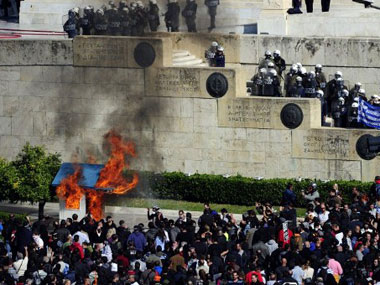Here’s the deal. I will forgive you half the money you owe me, if you take pay cuts, accept reductions in pensions, reduce the number of people you employ (maid, cook, driver), and generally accept a continuously declining standard of living for the next nine years. Plus, of course, you need to pay more tax.
But mind you, I will put my own accountant in your house to see that you don’t cheat on your promises. And after nine years, if we still think you are solvent, we may welcome you back as an equal to our club and lend you money again like old times.
Deal? Your first response will probably be the unprintable @#$%&!^$#@. And this is probably what the Greeks will say when the eurozone rescue package calling for extreme austerity from them is put to the vote. Greek Prime Minister George Papandreou, shaken by months of continuous street protests and public anger at what they are being asked to swallow, sees no other way to salvage his government but to ask for a referendum.
The odds are even that the Greeks will ask Europe to shove it up when asked for their opinion. This is why markets in Europe have been tanking as soon as news got around that Papandreou is planning to ask his people for their opinion on the eurozone’s bad idea.
There is fear that the messy compromise solution that emerged from the eurozone summit last week will end up with a Greek thumbs down and a disorderly winding down of Greek debt - probably through default of a partial repudiation. After that, all bets on the euro are off.
The three main elements of the eurozone package for debt-ridden Greece are a 50 percent reduction in private debts with banks and pension funds taking a “haircut”, a 100 billion debt reduction, in return for severe austerity measures. But at the end of it all, Greece will still have 120 percent of GDP as debt - twice as much as the European Union limit.
Impact Shorts
More ShortsBy any stretch of logic, if even nine years of pain and belt-tightening is not good enough to solve the problem, it makes more sense to default and take destiny in your own hands. The eurozone leaders will then have to decide whether to turf it out or otherwise quarantine the Greeks in some way.
However, the problem isn’t Greece. There’s a huge north-south divide in Europe - with the Germans and the French being stronger than their Mediterranean cousins.
It’s the south that could fall like dominoes after Greece, with Portugal, Spain and Italy following in short order. Portugal is already under EU-IMF administration, and Spain is slashing its budgets to make ends meet.
[caption id=“attachment_120887” align=“alignleft” width=“380” caption=“Protesters burn a guard box in front of the Greek parliament in Athens. AFP”]  [/caption]
All of them are up to their necks in debt and headed the same way as Greece in terms of rising unemployment rates, rising cost of money, and falling public confidence in a recovery.
While Greece is already about to go under, Portugal and Spain are tilting towards the precipice. “Portugal appears to have entered a Grecian vortex and monetary trends have deteriorated sharply in Spain,” says a report in The Telegraph, UK, quoting Simon Ward of Henderson Global Investors. And remember, Portugal’s debts are worse than Greece’s: 350 percent of GDP versus Greece’s 160 percent.
Why is Europe is such bad shape? The answer is a lack of political will to really build huge firepower to tackle this mother of all financial crises.
The latest package was simply too little, too late. The eurozone leaders have used mirrors to raise the value of the 440 billion rescue fund by leveraging it and make it look like 1 trillion, when what was required was more than $2 trillion to see that the contagion does not spread beyond Greece to Portugal and Spain.
But this is exactly what has been achieved. And the reason for it is that all the leaders of the eurozone are thinking country, not continent. Germany is fighting its last war (hyperinflation between the two world wars) and reluctant to reflate. France is worried that any larger rescue package backed by further debt will mean a downgrade of its own AAA credit rating.
If the two biggest beneficiaries of the eurozone - France and Germany - have chickened out of bolder measures, little wonder the package is coming unstuck as the richer north forces the poorer parts of southern Europe to tighten belts and swallow bitter pills.
As Ambrose Evans Pritchard writes in The Telegraph: “The two halves (north and south Europe) are locked together in a broken marriage. The structural gap cannot be closed by debt-deflation in the south. It could arguably be mitigated by ECB (European Central Bank) reflation (easy money), yet the central bank has done the opposite, blighting the chances that Spain might just be able to struggle back to viability.”
The eurozone is in a slow-motion dance to death and disaster. It will need a miracle to rescue the common currency.
But if the Greeks say screw the rescue package and austerity measures, the eurozone as it now stands will be history.


)

)
)
)
)
)
)
)
)



